The "eye-catching" fares that could be used to get passengers back on the buses in Lancashire
and live on Freeview channel 276
It comes after Lancashire County Council and Blackburn with Darwen Council were awarded £34.2m from the government after local authorities were last year invited to draw up bus service improvement plans.
The pair submitted a joint bid which saw them opt to pursue an “enhanced partnership” under which they will work closely with operators on issues such as tickets and timetables.


Advertisement
Hide AdAdvertisement
Hide AdThe county council’s cabinet member for highways and transport Charlie Edwards, told a cabinet meeting at which the partnership model was rubber-stamped that it would enable a tailored approach to bus improvement across the county.
“I like the fact that we are going to continue to work with individual operators [who] know the individual parts of the county better, but with[in] the overall strategy [and] the priorities of better ticketing and better timetabling.
“So we can do that element of it, the central bit, but the…operators will be able to excel in the communities which they already serve,” County Cllr Edwards said.
He revealed that the government had specifically requested when awarding the cash that the local authorities look into coming up with “eye-catching price measures” to make bus travel a more tempting prospect.
Advertisement
Hide AdAdvertisement
Hide AdCounty Cllr Edwards said that the two councils and the county’s bus operators were now exploring ways that were “really going to inspire people to get back on the buses, especially young people and the elderly community, the two groups – especially the older people – that have not not got back onto the buses like others [since the pandemic]”.
Labour opposition group leader Azhar Ali said that the best way of doing that would have been to opt for the franchising model that was also open to local authorities as part of their bus service improvement bids.
He said that such a system – as is being phased in by Greater Manchester from next summer – would have allowed the county to cap fares and should still be the ultimate ambition for Lancashire.
However, County Cllr Edwards said that he believed franchising would be a “retrograde step” for the county and did not believe that passengers would benefit from a return to the “dark days of nationalised bus services”.
Advertisement
Hide AdAdvertisement
Hide AdUnder the partnership plan, private bus operators retain a greater role in developing the services they deliver, whereas with franchising, local authorities offer contracts to firms to run pre-determined routes. They collect the fares and pay an agreed fee to the operator – meaning the financial risk rests with the councils.
Under either scenario, the changes hoving into view over the next nine months represent the biggest shake-up of buses in Lancashire since deregulation in 1986. Up until that point, services had been the domain of regional commissioners who dictated routes, timetables and fares – and created publicly-endorsed local monopolies for bus service provision.
The joint Lancashire and Blackburn bus service improvement plan seeks to improve journey times and ease-of-use by investing in bus priority measures at junctions, providing more consistent and accessible timetable information and developing a multi-operator ticketing system across all routes to make travel simpler and more attractive.
The two authorities had originally bid for £165m after the government encouraged councils to be ambitious in their proposals. Although the pair were ultimately awarded just a fraction of that amount, they were nevertheless one of just 31 successful bidders out of almost 80 nationwide.
Blackpool’s bus service improvement plan bid, which was submitted as a standalone application, did not secure any government funding.
